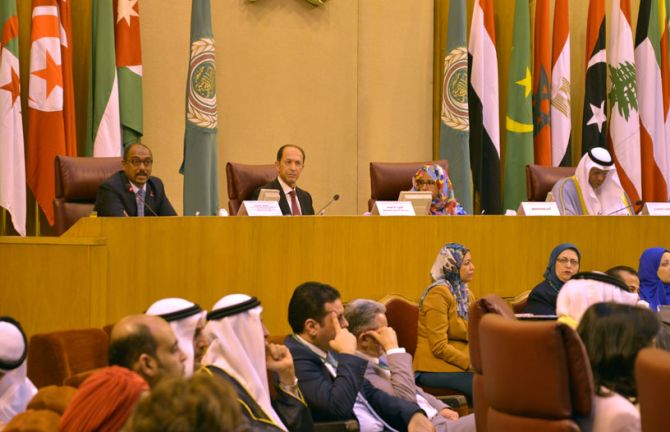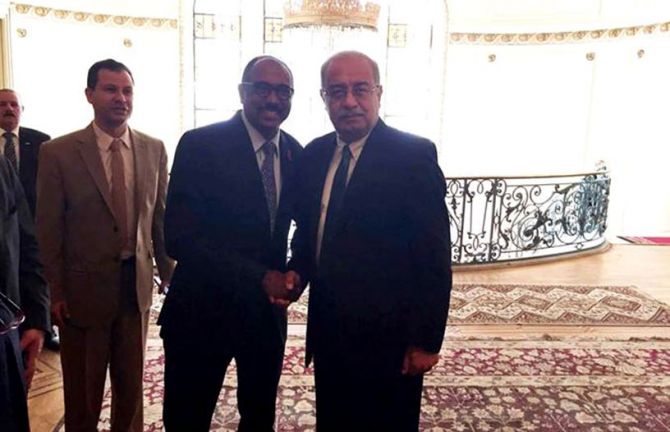


Update
Arab countries reaffirm their commitment to end the AIDS epidemic
07 March 2016
07 March 2016 07 March 2016The Council of Arab Ministers of Health has unanimously endorsed a resolution that urges countries to accelerate their efforts for the implementation of the Arab AIDS Strategy and to Fast-Track national responses to end AIDS by 2030.
Speaking at the council meeting, held in Cairo, Egypt, on 3 March, UNAIDS Executive Director Michel Sidibé commended the leadership the council and ministers have demonstrated in the AIDS response. He noted that the Arab AIDS Strategy (2014–2020) presents a unified position, is informed by evidence and considers regional specificities. He said that, in the context of the Sustainable Development Goals, there is an urgent need to reduce health inequities between countries by embracing global health security principles derived from values of social justice and inclusive societies for all.
Mr Sidibé also expressed hope that Oman, the United Arab Emirates and other Arab countries would soon be certified as having eliminated mother-to-child transmission of HIV. He urged countries that are on the verge of achieving this goal to finalize the validation process and become pioneers in the region.
The Deputy Secretary-General of the League of Arab States, Ahmed Benhelli, met with Mr Sidibé and pledged to mobilize support for the upcoming United Nations General Assembly High-Level Meeting on Ending AIDS, to be held in June in New York, United States of America. In bilateral meetings with the Ministers of Health of Bahrain, Djibouti and Libya, Mr Sidibé highlighted the importance of high-level participation by Arab countries and their effective contribution to a strong political declaration.
The significant and catalytic leadership role Egypt has in the region was raised by Mr Sidibé in a meeting with the Egyptian Prime Minister, the Assistant Minister of Foreign Affairs, the Minister of Health and the Minister of Social Solidarity. He emphasized that Egypt is forging strong partnerships in Africa, especially in the local production of medicines, which is essential to ensure and sustain universal health coverage in the Middle East and Africa.
During his visit to Egypt, Mr Sidibé was introduced to Yousra, a renowned actress and singer who was recently appointed as a UNAIDS Regional Goodwill Ambassador for the Middle East and North Africa. Through her advocacy, Yousra has shown the impact regional champions and celebrities can have in building bridges and reaching out to leaders to end AIDS in the region by 2030.
Quotes
“This region can be a hub of excellence and greater partnership for development in Africa. Its values of social justice and inclusive society can help significantly reduce inequality as a threat to global health security.”
“Through the strong, dynamic partnership with the UNAIDS regional support team, we have achieved great results in the last three years. The League of Arab States is committed to supporting the United Nations General Assembly High-Level Meeting on Ending AIDS and a strong political declaration to end AIDS by 2030.”
“Egypt strongly supports the mandates of UNAIDS and is keen to fulfil them in line with an evidence-based approach while using the best expertise, innovative thinking and the right advocacy messaging to reach global agreement in the AIDS response, including at the United Nations General Assembly High-Level Meeting on Ending AIDS.”
“Engaging civil society organizations and a very benevolent private sector in our work is extremely crucial in service provision. They can help us with awareness and sensitization, tolerance, fighting stigma and discrimination and scaling up social protection programmes.”
Region/country
Related
 Government ensures continuity of treatment in Malawi
Government ensures continuity of treatment in Malawi

10 February 2025


